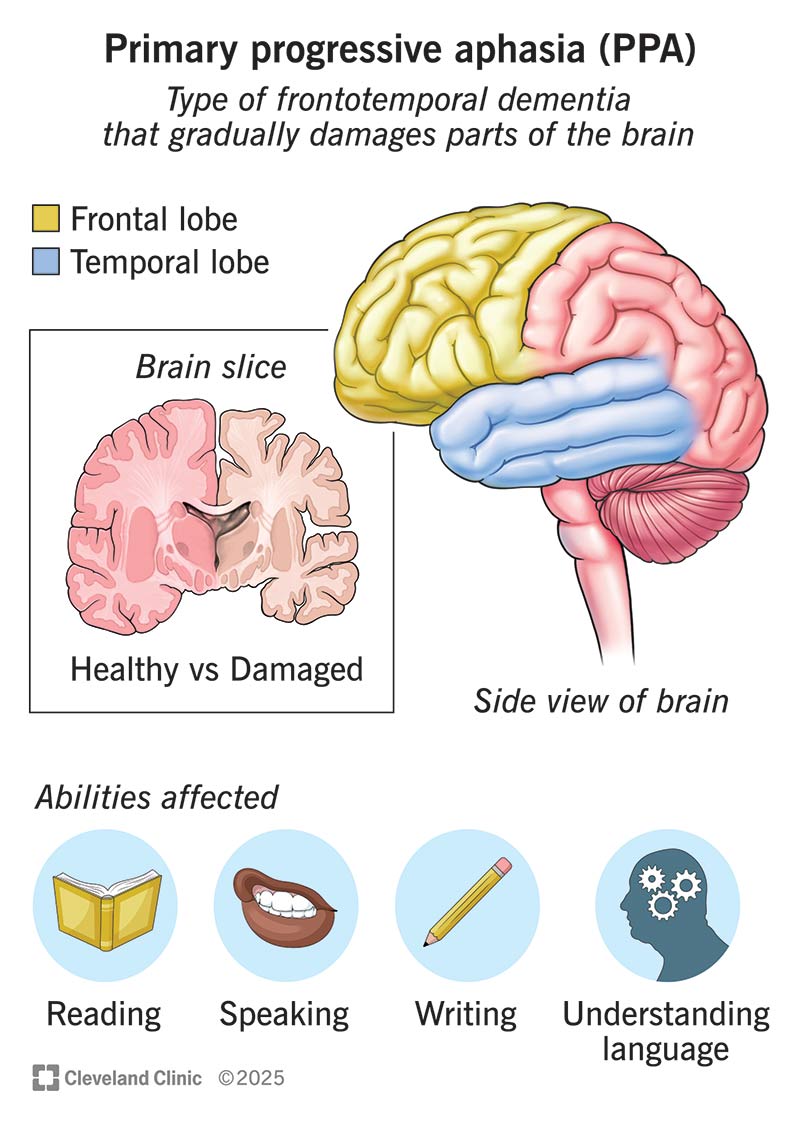Primary progressive aphasia (PPA) is a neurodegenerative condition that causes a loss of language skills. At first, you may have trouble finding the correct words to say or understanding others. Over time, you may lose all verbal or written communication skills. It may also affect your thinking and behavior. Treatment may slow symptom progression.
Advertisement
Cleveland Clinic is a non-profit academic medical center. Advertising on our site helps support our mission. We do not endorse non-Cleveland Clinic products or services. Policy

Image content: This image is available to view online.
View image online (https://my.clevelandclinic.org/-/scassets/images/org/health/articles/primary-progressive-aphasia)
Primary progressive aphasia (PPA) is a neurodegenerative disease that affects your ability to speak, read, write and understand language. Neurodegenerative diseases gradually damage parts of your brain. They get worse over time.
Advertisement
Cleveland Clinic is a non-profit academic medical center. Advertising on our site helps support our mission. We do not endorse non-Cleveland Clinic products or services. Policy
If you have PPA, you may notice it’s difficult to find the right words to express yourself. Or you may have trouble understanding directions. Over time, you may not be able to read the newspaper, write your name or comprehend what your loved ones are saying to you.
PPA is a type of frontotemporal dementia (FTD) or Alzheimer’s dementia. These are a group of conditions that cause the frontal or temporal lobes of your brain to lose their function over time. These lobes are responsible for speech and language, among other functions.
It can be a challenging and frustrating condition to live with. It can also emotionally affect caregivers or loved ones who help those diagnosed with this condition. A healthcare provider can help you manage symptoms.
There are three types:
Advertisement
Primary progressive aphasia symptoms vary based on the type. They affect your ability to:
Symptoms usually develop between ages 50 and 70. They get worse over time.
Symptoms of the logopenic variant may include:
Symptoms of the non-fluent (agrammatic) variant may include:
You may not feel comfortable speaking at all (mutism) if you have non-fluent PPA.
Symptoms of the semantic variant may include:
This condition develops when the parts of your brain that control language start breaking down. This happens in your frontal and temporal lobes (depending on the type). Your brain tissue shrinks (atrophies), affecting your ability to communicate and understand language.
This condition may affect anyone. You may be more at risk if you have:
Sometimes, it may happen for no known reason.
As PPA gets worse, you may develop symptoms that affect your:
This can make performing everyday tasks difficult or unsafe. It can also lead to mental health challenges, like depression or anxiety.
A healthcare provider will diagnose primary progressive aphasia after a physical examination and testing. They’ll ask questions to learn more about your medical history and known biological family history to see if you have an increased risk of PPA.
Testing may include:
Your healthcare provider may diagnose primary progressive aphasia in stages. Stages of PPA include:
Advertisement
Your provider will keep track of your symptoms, noting how they progress. The stage may change as the condition affects more of your brain.
There isn’t a cure for primary progressive aphasia. There’s currently no way to stop it from getting worse. But some treatments may slow the disease’s progression or increase your quality of life.
Your provider may recommend the following treatment options for PPA:
Visit a healthcare provider if you have trouble with your speech or language skills. Let them know if these symptoms get worse and make it difficult for you to do certain activities. Some examples might include:
Primary progressive aphasia worsens over time. You may eventually lose your language and communication skills after many years. As the condition affects more of your brain, it will also affect your thinking and behavior. This may make living independently unsafe. Your care team will be available to help you as the condition gets worse.
Advertisement
It’s important to discuss this diagnosis with your loved ones as early as possible. You can make a plan to file an advance directive. This document lets your loved ones know how to care for you when you’re unable to care for yourself. If you’re unsure where to start, talk to a healthcare provider.
The life expectancy for primary progressive aphasia varies from person to person. Many people live for several years after diagnosis, often around five to seven, and sometimes longer from when symptoms first appear.
The best person to talk to about your situation is your provider. Your case may or may not match statistics.
Learning about a primary progressive aphasia (PPA) diagnosis can be a lot to handle emotionally. It might be difficult to imagine yourself in a time when you won’t be able to understand language as you’re reading this right now.
While there isn’t a cure available yet, there are a lot of treatment options. These may help you manage or delay symptom progression. As things start to change, it’s important to take them day by day. You may need to learn new forms of communication or different ways of doing things to stay safe. Your care team will be with you and your loved ones every step of the way.
Advertisement

Sign up for our Health Essentials emails for expert guidance on nutrition, fitness, sleep, skin care and more.
Learn more about the Health Library and our editorial process.
Cleveland Clinic’s health articles are based on evidence-backed information and review by medical professionals to ensure accuracy, reliability and up-to-date clinical standards.
Cleveland Clinic’s health articles are based on evidence-backed information and review by medical professionals to ensure accuracy, reliability and up-to-date clinical standards.
When losing your language skills turns out to be primary progressive aphasia, you’ll want the best care. Cleveland Clinic’s neurology experts are here for you.
